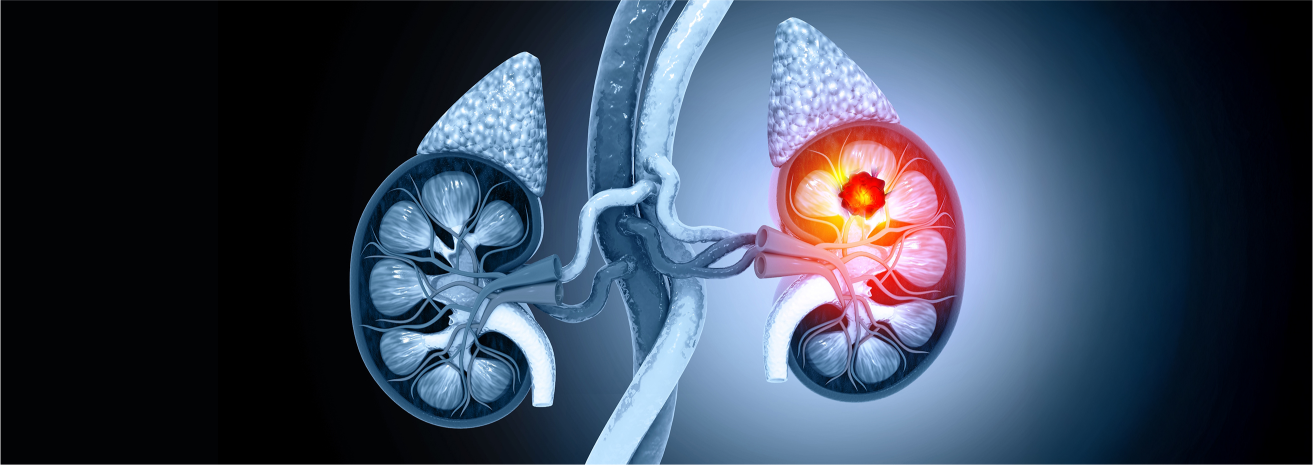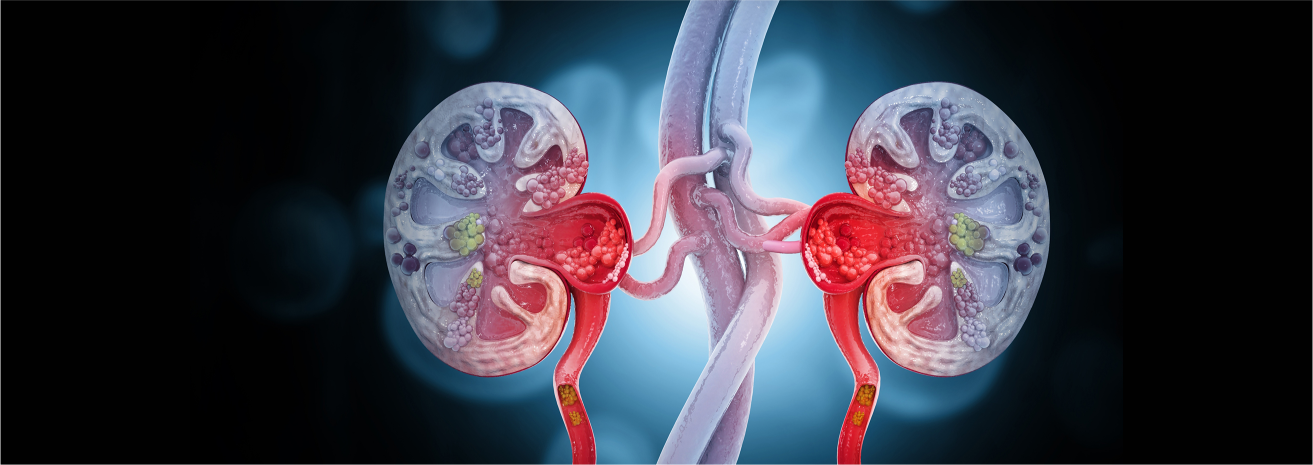Kidney Cancer

Kidney cancer, also known as renal cell carcinoma, is the most common type of cancer that starts in the kidneys. It often develops in older adults but can occur at any age. Early detection increases the chance of successful treatment. At Burjeel Cancer Institute, we offer comprehensive care for kidney cancer, including advanced surgical techniques, targeted therapies, immunotherapy, and radiation therapy, with personalized treatment plans designed to meet each patient's specific needs
Common Symptoms of Kidney Cancer include
- Blood in the urine (hematuria)
- Lower back or side pain, often below the ribs
- Unexplained weight loss
- Fatigue
- Loss of appetite
- Fever not related to an infection
- A lump or mass in the lower back or side

Risk Factors for Kidney Cancer include
Smoking
Increases the risk of kidney cancer, particularly in heavy smokers.
High Blood Pressure
Hypertension is linked to an increased risk of kidney cancer.
Obesity
Excess body weight increases the risk of developing kidney cancer.
Family History
Having close relatives with kidney cancer can increase the risk.
Certain Genetic Conditions
Inherited syndromes, such as von Hippel-Lindau disease or hereditary papillary renal cell carcinoma, raise the risk.
Exposure to Certain Substances
Occupational exposure to asbestos, cadmium, or certain chemicals increases the risk.
Diagnostic Procedures
We use a range of advanced diagnostic procedures to detect and stage kidney cancer accurately, including
CT Scan
Provides detailed cross-sectional images of the kidneys to locate tumors and determine the extent of cancer.
MRI
Offers high-resolution imaging to assess the spread of cancer, particularly to nearby blood vessels or organs.
Ultrasound
Often used as a first step to detect masses or abnormalities in the kidneys.
Intravenous Pyelogram (IVP)
A series of X-rays taken after injecting a contrast dye to evaluate the kidneys, ureters, and bladder.
Biopsy
In certain cases, a tissue sample may be taken from the kidney for laboratory analysis to confirm the diagnosis.
PET-CT Scan
Combines positron emission tomography with computed tomography to detect cancer and evaluate if it has spread to other parts of the body.

Treatment Options
Targeted Therapy and Immunotherapy
- VEGF Inhibitors: Drugs like sunitinib or pazopanib help block the growth of new blood vessels that feed tumors, slowing cancer growth.
- mTOR Inhibitors: Drugs such as everolimus and temsirolimus target a protein that promotes tumor cell growth.
- Checkpoint Inhibitors (Immunotherapy): Drugs like nivolumab and pembrolizumab boost the immune system's ability to recognize and attack kidney cancer cells.
- Tyrosine Kinase Inhibitors (TKIs): Target specific proteins that cancer cells need to grow, helping slow or stop the growth of tumors.
Radiation Therapy
- External Beam Radiation Therapy (EBRT): High-energy rays are directed at the kidney tumor to destroy cancer cells, often used when surgery is not an option or in cases of metastatic kidney cancer.
- Stereotactic Body Radiation Therapy (SBRT): Delivers precise, high doses of radiation to target kidney tumors while minimizing exposure to healthy tissues.
- Chemotherapy and Medical Oncology: Chemotherapy is rarely used for kidney cancer as it is not typically effective against renal cell carcinoma, but may be used for certain rare kidney cancer types.
Surgical Treatment
- Partial Nephrectomy: Removal of the tumor along with a small portion of the kidney, often used in early-stage kidney cancer or when preserving kidney function is important.
- Radical Nephrectomy: Removal of the entire kidney, often including surrounding tissues, lymph nodes, and sometimes the adrenal gland, depending on the stage and location of the cancer.
- Minimally Invasive Surgery (Laparoscopic/Robotic Surgery): Used for both partial and radical nephrectomies, offering smaller incisions, faster recovery, and less post-operative pain.
Multidisciplinary Approach
Kidney cancer treatment requires collaboration among a team of experts who provide comprehensive care. Our team includes
- Gynecologic Oncologists
- Medical Oncologists
- Radiation Oncologists
- Surgical Oncologists
- Radiologists
- Pathologists
- Genetic Counselors
- Oncology Nurses
- Palliative Care Specialists
This multidisciplinary approach ensures that patients receive personalized care tailored to their individual needs


Supportive Care and Patient Services
We offer a variety of supportive care services to help kidney cancer patients manage their treatment and maintain their quality of life
Nutritional Counseling
Tailored dietary advice to help patients maintain strength and manage side effects during treatment.
Palliative Care
Symptom management and quality-of-life support for patients with advanced or metastatic kidney cancer.
Psychosocial Support
Counseling services for patients and their families to cope with the emotional and psychological challenges of a cancer diagnosis.
Physical Rehabilitation
Post-surgical rehabilitation programs designed to help patients regain strength and improve mobility after kidney cancer surgery.
Survivorship Program
Ongoing care and monitoring for patients who have completed treatment, focusing on long-term health and recurrence prevention.
Meet Our Experts
We guide kidney cancer patients through every step of their journey, ensuring personalized care and support
Patient Journey
Initial Consultation
A thorough evaluation with the kidney cancer care team, including diagnostic imaging and tests to assess the stage and extent of the disease.
Personalized Treatment Plan
A customized treatment plan is developed based on the patient’s diagnosis, preferences, and overall health.
Treatment and Support
Patients undergo the recommended treatments, supported by a multidisciplinary team and personalized supportive care services.
Follow-Up Care
After treatment, patients receive regular follow-ups to monitor their recovery, assess treatment response, and manage long-term health concerns.







